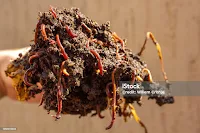 |
| Red worms that helps in vermicomposting |
Vermiculture Farming
Understanding Vermiculture: An Introduction
In today's rapidly changing world, the significance of accurate weather forecasts cannot be overstated.
The Importance of Vermiculture in Sustainable Agriculture
Sustainable agriculture is a hot topic these days, with more and more people realizing the importance of finding environmentally friendly and resource-efficient methods of food production.
One such method gaining popularity is vermiculture – the process of utilizing worms to compost organic waste and produce nutrient-rich vermicomposting.
Vermiculture offers numerous benefits and is something that everyone should consider incorporating into their gardening practices. First and foremost, vermiculture is an excellent way to reduce organic waste. By feeding your organic waste to red worms, you can divert a significant amount of material from ending up in landfills.
This not only helps reduce greenhouse gas emissions but also promotes a circular economy by turning waste into valuable resources.
Furthermore, vermiculture helps improve soil health by producing high-quality vermicompost. Vermicompost is packed with beneficial microorganisms, nutrients, and organic matter that enhance soil fertility, structure, and water-holding capacity.
Incorporating vermicompost into your gardening practices can result in healthier plants that are more resistant to pests and diseases. Another significant advantage of vermiculture is its sustainability. By utilizing worms to compost organic waste, vermiculture reduces the need for synthetic fertilizers and chemical inputs in agriculture.
This promotes a more sustainable and eco-friendly method of food production.
Starting Your Own Vermiculture: A Comprehensive Guide
If you're someone interested in sustainable agriculture or simply looking for a way to reduce waste and create nutrient-rich soil, starting your own vermiculture system is a great option to consider. Here are some compelling reasons why you should start vermiculture:
1. Boost Soil Fertility: Vermicomposting, the end product of vermiculture, is a nutrient-rich natural fertilizer that enhances soil fertility. Adding vermicomposting to your soil can provide essential nutrients like nitrogen, phosphorus, and potassium, improving the overall health and productivity of your plants.
2. Reduce Organic Waste: Vermiculture is an excellent way to manage organic waste. By composting organic waste using worms, vermiculture helps divert waste from landfills and reduces greenhouse gas emissions.
3. Improve Plant Health: The nutrients and beneficial microorganisms present in vermicomposting promote strong root development, disease resistance, and overall plant health.
4. Create a Sustainable Cycle: Vermiculture creates a sustainable cycle of organic waste. The organic waste produced from your kitchen scraps, yard clippings, and other biodegradable materials can be recycled through vermiculture to create nutrient-rich vermicomposting, which can then be used to nourish your plants and garden.
5. Enhance Environmental Sustainability: Vermiculture contributes to environmental sustainability by reducing the need for chemical fertilizers and synthetic pesticides.
Benefits of Vermiculture: Why You Should Consider It
In addition to the reasons mentioned above, there are several other benefits to consider when it comes to starting your own vermiculture system:
1. Conserve Water: Vermicomposting has the ability to retain moisture in the soil, reducing water requirements for your plants. This can be especially beneficial in areas with limited water resources or during drought conditions.
3. Promote Biodiversity: Vermiculture promotes biodiversity by creating a habitat for beneficial organisms like earthworms, microorganisms, and insects.
3. Create a Closed-loop System: Vermiculture allows you to create a closed-loop system where waste is transformed into a valuable resource.
 |
| Process of vermicomposting using red worms |